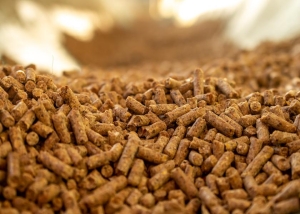


(Posted on 23/04/24)
The American Feed Industry Association (AFIA) has commended Representatives Ashley Hinson, R-Iowa-02, and Elissa Slotkin, D-Mich.-07, for introducing the Securing American Agriculture Act (H.R. 8003). The bill would require the U.S. Department of Agriculture to study global supply chain markets for U.S. agricultural inputs, including feed ingredients like vitamins and amino acids used in animal feed and pet food production. The AFIA supports this bill, given its members’ concerns over the vulnerability of the animal food supply chain given China’s domination of the vitamin supply market.
AFIA’s President and CEO Constance Cullman issued the following statement upon the bill’s introduction: “We thank Congresswomen Hinson and Slotkin and bipartisan cosponsors for introducing the Securing American Agriculture Act – a bill that will help U.S. decision-makers better understand how intrinsically linked our food and feed supply is with China’s input manufacturers as they manage the country’s delicate relationship with China. AFIA’s feed and pet food manufacturing members are gravely concerned about the United States’ dependency on China for vitamins and other critical inputs necessary to produce complete diets for America’s domestic livestock and pets. Just like us, animals require daily vitamins for healthy growth and development. Our industry is prepared to work with the federal government to do everything in its power to head off these risks before they cause catastrophic animal welfare, food security or economic repercussions."
Vitamins are essential for promoting healthy growth and productivity in animals. In the United States, animal food manufacturers heavily rely on China for a consistent supply, with limited alternatives. China holds a commanding position in global vitamin production, exclusively manufacturing key vitamins such as B1, B3, B8, B11, B12, C, D3, and DK3. Additionally, China produces nearly 85% of the some of the world's essential amino acids crucial for animal feed, underscoring its significant influence in the global market. This dependency raises concerns about supply chain vulnerabilities and highlights China’s critical role in American food security.
The AFIA is advocating for strengthening and diversifying the U.S. vitamin supply chain to reduce economic vulnerabilities and strategic risks. This requires a multifaceted approach that balances economic interests with broader strategic considerations to ensure resilience in both the animal food and farm sectors.
The National Grain and Feed Association (NGFA) has applauded Senator Deb. Fischer’s (R-Neb.) reintroduction... Read more
Anglo American plc and Teck Resources Limited have received regulatory approval from the Government... Read more
The Rhodes Ridge Joint Venture has approved a $191 million (A$294 million) (Rio Tinto share $96 million... Read more
Trafigura Group Pte Ltd, a global leader in the commodities industry, has announced its financial results... Read more
Rio Tinto has successfully produced the first copper from the Johnson Camp mine in Arizona using its... Read more
The American Soybean Association’s World Initiative for Soy in Human Health programme and the... Read more
Karlka Nyiyaparli Aboriginal Corporation (KNAC) Registered Native Title Body Corporate and Rio Tinto... Read more
OCI Global, a leading global producer and distributor of nitrogen products has announced that it has... Read more
In December 2024, SSAB was granted a permit by the Land and Environment Court at Umeå District... Read more
The President of the Republic of Guinea has joined project partners WCS1, Baowu, Chinalco and Rio Tinto... Read more